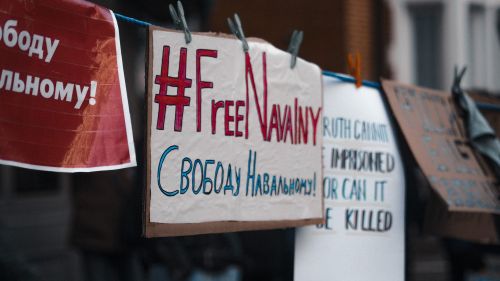As Biden Sanctions Russia, Russians Not Convinced Kremlin Behind the Poisoning

Brendan Helm discusses President Biden's new sanctions on Moscow due to Alexei Navalny's arrest.
President Joe Biden on Tuesday, March 2 formally accused Russia of poisoning Alexei Navalny and unveiled new sanctions on Moscow for the first time since he took office. In January, Navalny was arrested and sentenced to three and a half years in prison after he returned to Russia from Germany where he was seeking treatment from his poisoning. Biden’s sanctions are targeted at seven top Russian officials–though not President Vladimir Putin–and 14 entities related to chemical production in Russia. However, what do Russians think about Alexei Navalny and his poisoning?
Data from a January-February survey by the Levada Analytical Center in Russia shows that while certain groups of Russians support Alexei Navalny, they are overall more likely to have unfavorable (49%) than favorable (25%) feelings about him. Moreover, when asked whether or not they support or oppose his activities, a majority expresses disapproval (56%) while just 19 percent say that they approve.
Regarding his decision to return to Russia, a move hailed as brave act of defiance abroad, 51 percent of Russians say that they are indifferent or neutral. Among the rest, slightly more Russians say that they disapprove (25%) than approve (22%). More broadly, when asked to describe their feelings toward Navalny, the most common response is neutral or indifferent (29%). After that, the most common responses are that they can’t say anything good about him (16%) and that they can’t say anything bad about him (14%).
With this indifference, many Russians also hesitate to believe that the Russian government was the culprit for Navalny’s poisoning. When asked what they believe is the most plausible scenario surrounding the assassination attempt, a plurality says that there was no poisoning, and that all of it was staged (30%). Another 19 percent say that the attempt was a provocation by Western intelligence services and just 15 percent say that it was the government’s attempt to eliminate a political opponent.
Despite the predominant indifference and unfavorable views, there are certain groups of Russians who have a much more favorable view of Navalny, one of which is Russian youths aged 18-24. For this demographic, 48 percent say they have a favorable view of Navalny while one third say they have unfavorable views. This group is also much more likely to approve of Navalny’s return to Russia (40%) than older age groups.
Beyond young Russian people, Navalny also finds support in the section of the population that uses the application Telegram to receive their news. Among these Russians, 49 percent have a favorable view of Navalny while 37 percent say they have an unfavorable view. And 45 percent of Telegram users say they approve of Navalny’s activities.

